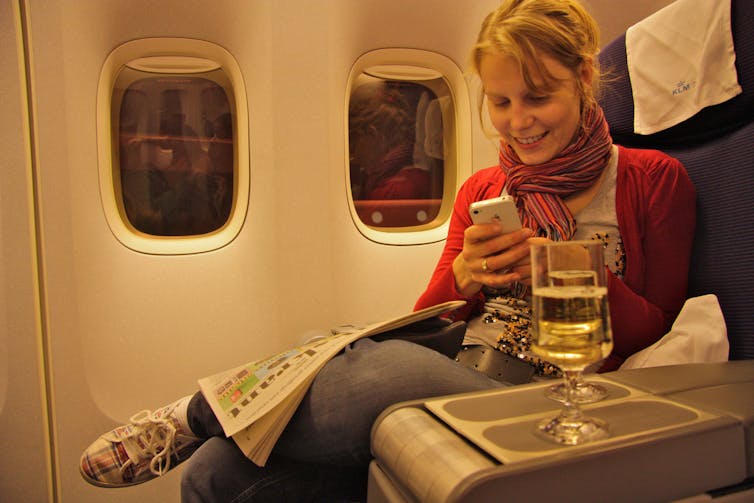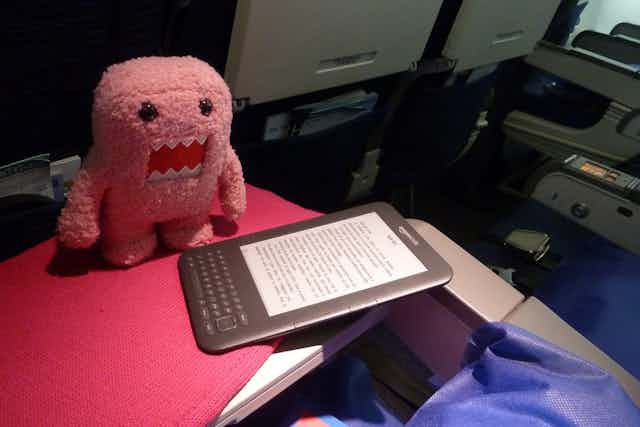Earlier this year, the US Federal Aviation Authority (FAA) put together a panel of aviation experts to look at whether personal electronic devices (PEDs) could be used on planes without compromising safety.
The results are in: the committee is recommending that electronic devices - such as tablets, e-readers and other PEDs - be allowed during all phases of flight (including take-off and landing).
The FAA asked the Advisory and Rulemaking Committee to investigate this particular issue after growing public scepticism about limitations, and increased public pressure to allow passengers to use their electronic devices during all phases of flight.
When applicable, passengers will have to switch their devices to airplane/flight mode. Passengers will hence be allowed to listen to music, watch a movie, play games or read an e-book on their e-reader or tablet - as long as the data was downloaded and saved on the device before take-off.
As the committee’s report points out, many new generation aircraft have the appropriate shielding to prevent any interference from PEDs that may be on board.
The FAA is widely expected to follow through with the committee’s recommendations and will likely begin implementation next year. Other regulatory agencies, such as Australia’s Civil Aviation Safety Authority (CASA), are expected to follow FAA’s lead on the issue.

No talking on mobile phones
The committee is maintaining restrictions on devices capable of connecting to a mobile phone network and/or with data communication capability. Hence, mobile phones are not expected to be allowed to be used during take-offs and landings any time soon. They will be required to be put on “flight mode”.
A mobile phone searching for a network tower emits much higher energy radio waves and is therefore more likely to cause electromagnetic interference (EMI). Another concern is that a plane flying with several hundreds of phones attempting to connect to a nearby tower would cause unnecessary strain on the mobile phone network.
However, some airlines are already offering products that allows their passengers to make phone calls on their flight. Emirates has been pushing for this technology for several years. It relies on pio-cell technology which is basically an on-board antenna which relays calls to towers on the ground. The system is controlled by the flight crew.
What’s taken so long?

Pressure on the FAA sharply increased over the past few years as electronic device use skyrocketed and airline passengers became increasingly dependent on them.
As Brazilian illustrator Felipe Luchi so perfectly illustrated in his artwork, we are becoming increasingly dependent on our mobile devices.
The decision to allow the use of electronic devices on planes may seem self-evident to some, but the committee was rigorous. The committee was set to release its recommendation months ago but asked for an extension as there was a large amount of data to review and evaluate.
Public perception that a small device like a mobile phone could not possibly interfere with a plane’s electronics is at the core of the issue - as shown by the parody below.
A recently conducted survey showed that 30% of passengers admitted to not turning off their mobile phone when flying - but how many of them are actual aviation safety experts? Does knowing how to use an iPhone give someone the expertise to assess whether it can take interfere with a plane’s electronics?
Evidence-based policy is - as the term suggests - based on evidence. As is usually the case with research, it is extremely difficult to come up with a black-and-white answer. Research outcomes are made up of shades of grey: assessing likelihood, risk and so on.
As pointed out in a previous piece for The Conversation, interference allegedly due to phone calls during flight has been reported - but the lift of the ban on electronic devices such as e-readers and tablets is certainly most welcome.

